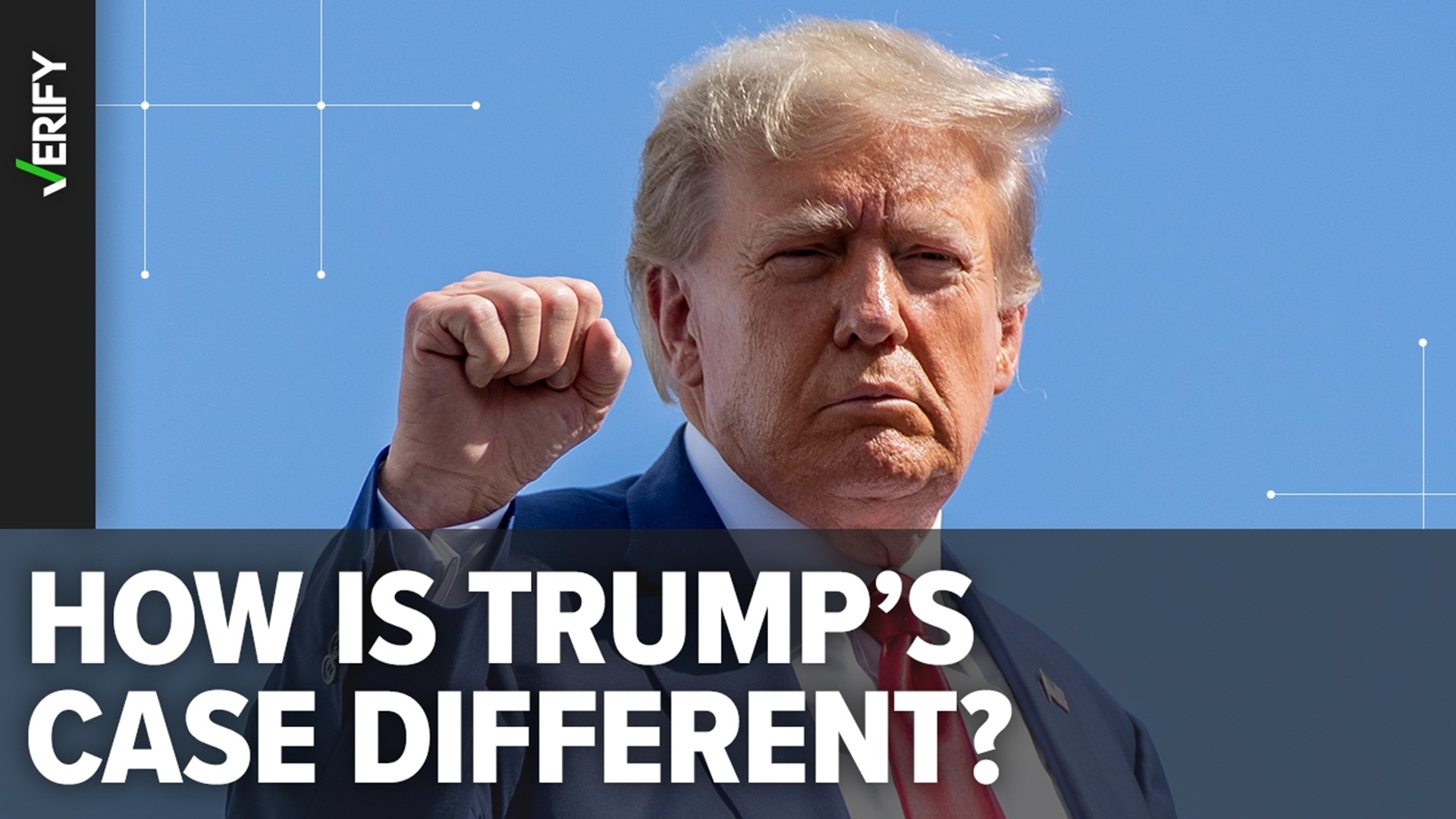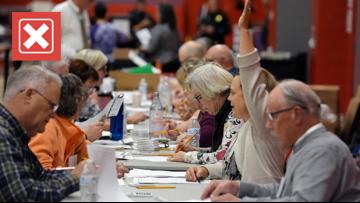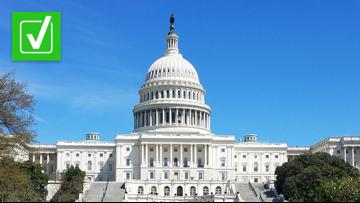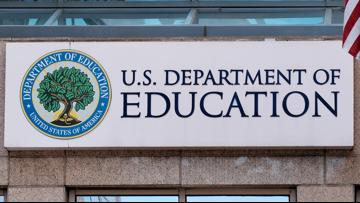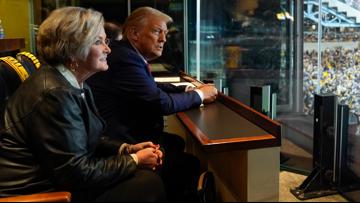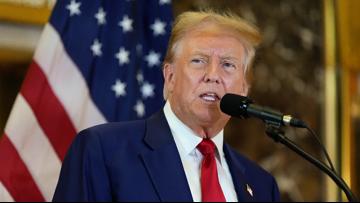Donald Trump and his supporters responded to the former president’s federal indictment for mishandling classified documents by calling it a politically motivated witch hunt.
They say several other politicians have also gotten in trouble for how they handled sensitive material – including Joe Biden, former Vice President Mike Pence, and former Secretary of State Hillary Clinton – yet Trump is the only one who’s been charged with crimes.
Here are VERIFIED details on what happened in each case and their key differences.
THE SOURCES
Indictment of Donald Trump
Statement by FBI Director James Comey on Clinton email investigation
Statements by Richard Sauber, attorney for Joe Biden
Letter by Greg Jones, attorney for Mike Pence
THE CASES
Joe Biden
On Nov. 2, 2022, personal lawyers for President Joe Biden were emptying a private office Biden had held near Capitol Hill in the years between the end of his term as vice president and his campaign for the presidency. In a closet at the office – a think tank called the Penn Biden Center – they came across a batch of documents Biden had retained from his time as vice president.
Some of those documents were classified. Biden attorney Richard Sauber called them “a small number of documents with classified markings” and said the closet was kept locked.
According to Sauber, the White House Counsel, the National Archives, and the Department of Justice were all promptly notified, and the National Archives recovered the documents the day after they were discovered.
Biden lawyers then conducted searches of other Biden properties, and found more classified documents in his home in Wilmington, Delaware. These were found specifically in his garage, except for one document that was later found in his personal library. According to Attorney General Merrick Garland, these documents were also recovered immediately, this time by the FBI.
During the cleanout of the Penn Biden Center, Biden’s lawyers shipped some documents to a law office in Boston. The National Archives also requested and obtained those documents, though there has been no indication any of them were classified.
We do not know the precise nature of the classified material. CBS News reported that all told about 20 classified documents were found in places they shouldn’t have been.
The discoveries were not made public until weeks after they were made, when CBS learned and reported the DOJ was investigating.
Garland, a Biden appointee, has since appointed a special counsel to head up an investigation into Biden’s handling of classified material. That man, Robert Hur, is a former U.S. attorney who was appointed by Trump. The investigation remains ongoing.
Critics of the president have also accused him of holding “1,850 boxes” of documents at the University of Delaware and refusing to turn them over to investigators. The documents in question are from Biden’s time as a senator. Biden consented to FBI searches of the material when agents requested to review it as part of their broader investigation. The FBI provided no indication any classified documents were found in the university collection.
Mike Pence
On Jan. 16, 2023, shortly after the Biden document story went public, former Vice President Mike Pence hired a team to search his home in Carmel, Indiana.
They found “a small number of documents bearing classified markings that were inadvertently boxed and transported” to Indiana, according to a letter from Pence lawyer Greg Jones to the National Archives.
We do not know precisely how many documents were classified, where in the home they were stored, or what type of material they contained.
According to the letter, Pence and his team “immediately secured those documents in a locked safe pending further direction on proper handling from the National Archives.”
The documents were soon collected by the FBI, who later – with Pence’s cooperation – conducted their own search and found an additional document with classified markings.
The Department of Justice conducted and closed an investigation, electing not to pursue any criminal charges against Pence. The DOJ at the time was headed by Biden appointee Merrick Garland.
Hillary Clinton
Clinton, the 2016 Democratic nominee for president and former Secretary of State under President Obama, is the only one in the group whose controversy surrounded digital communications rather than physical documents.
She was famously investigated for using a personal email server while Secretary of State, instead of secure government channels. Unlike the Pence and Biden investigations, it began not at Clinton or her team’s own behest, but because of a referral from the Intelligence Community Inspector General to the Department of Justice.
After a nearly yearlong investigation, the FBI announced it had found that 110 of the emails sent over the server contained classified information. According to FBI Director James Comey, “Only a very small number of the e-mails containing classified information bore markings indicating the presence of classified information. But even if information is not marked ‘classified’ in an email, participants who know or should know that the subject matter is classified are still obligated to protect it.”
Comey said Clinton and her team had been “extremely careless in their handling of very sensitive, highly classified information.”
He also said that while “we did not find direct evidence that Secretary Clinton’s personal email domain… was successfully hacked… we assess it is possible that hostile actors gained access.”
Comey recommended no criminal charges against Clinton, saying “no reasonable prosecutor would bring such a case” because there was no evidence of any intent to release classified information to the public or harm the United States and its interests.
He said Clinton and her team cooperated with the investigation, handing over roughly 30,000 emails. Another estimated 30,000 were not handed over; Clinton’s team judged them to be personal emails (e.g. plans for her daughter's wedding) rather than work-related, and deleted them.
Comey said that while “the lawyers cleaned their devices in such a way as to preclude complete forensic recovery… we believe our investigation has been sufficient to give us reasonable confidence there was no intentional misconduct in connection with that sorting effort.”
Comey was appointed FBI director by Obama; a decade prior he had been appointed as a U.S. attorney by President George W. Bush.
Donald Trump
The Trump case began in early 2021, when a few months after Trump moved out of the White House and into his Mar-a-Lago estate in Florida, the National Archives realized it was missing certain documents that should have been turned over at the end of Trump’s time as president.
After months of discussion between lawyers for the National Archives and Records Administration (NARA) and lawyers for Trump, 15 boxes of material were returned to NARA. Of those, the agency identified that 14 boxes contained classified documents.
On Feb. 20, 2022, NARA referred the matter to the Department of Justice to investigate how those documents made their way to Mar-a-Lago and how they were stored once there. The ensuing investigation by the FBI found evidence there could be even more classified material in Florida that Trump did not turn over. Since 2017, the director of the FBI has been Christopher Wray, originally appointed by Trump.
On May 11, 2022, the DOJ issued a subpoena, legally compelling Trump to hand over classified documents at his property. In a meeting with investigators, Trump provided 38 more documents, but agents also noticed he still had boxes of material in a storage closet that he did not permit them to view.
On Aug. 8, 2022, the FBI executed a search warrant it had obtained a few days prior. They found and seized several more boxes of classified material at Mar-a-Lago.
On Nov. 18, 2022, Attorney General Merrick Garland appointed a special counsel to investigate Trump for federal crimes, including his handling of documents, especially those containing information pertinent to national defense.
On June 8, 2023, a grand jury in Florida indicted Trump on 37 federal charges. The indictment alleges Trump illegally kept more than 300 classified documents at Mar-a-Lago, which is not only his home but also a club used by hundreds of people without security clearances. It provides photographic evidence that Trump and his team stored boxes of these documents in a bathroom, on a ballroom stage, and in a storage closet at the club. It also says Trump showed the material to people who weren’t authorized to see it, and states that an audio recording of Trump in one such case demonstrates he knew what he was doing was against the law, and that the material he was sharing was classified.
Thirty-one of the 37 charges are for Trump illegally retaining documents containing defense intelligence. The other six charges relate to his alleged efforts to obstruct the investigation. The FBI says Trump concealed documents, conspired with a staffer to hide documents, and made false statements to agents in an attempt to mislead and thwart investigators.
On June 13, 2023, Trump entered a plea of not guilty. He has denied any wrongdoing.
THE KEY DIFFERENCES
Biden, Pence, Clinton, and Trump all improperly handled classified material. Although the number of documents, their contents, and in what way they were stored varies, Biden, Pence, and Trump all had documents in their homes that should not have been there. Clinton sent classified material over an unsecured email system.
All four were investigated by the Department of Justice, involving the FBI, under Attorneys General and FBI Directors from both parties. But only Trump has faced criminal charges.
The most significant difference between the cases is what each person did after the misconduct was discovered. Biden notified authorities and cooperated with the ongoing investigation. Pence requested the search of his own home. Clinton was not the one to instigate her investigation, but once it began the FBI said she did not interfere with it.
Conversely, Trump has been accused by the FBI of actively obstructing their attempts to recover classified material, repeatedly misleading investigators and illegally withholding documents.
In the other three cases, investigators say they found no evidence of ill intent. Trump, they say, knew what he was doing was wrong and took steps to continue doing it and to hide it from authorities.
